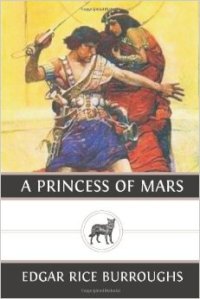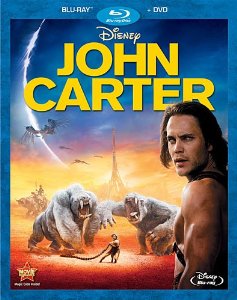PODCAST:
Listen to the podcast here (click to play/right click and select “save target as” to download):
S1E4 – A Princess of Mars – John Carter *
WRITTEN BOOK REVIEWS:
Wilk: 4 Stars “…It presents a number of original ideas and is a page turner. It also was written in a different time- and it shows…”
(Click the links to read full written reviews on Goodreads.com)
SUBJECT MATTER:
Book: “A Princess of Mars” by Edgar Rice Burroughs
“A Princess of Mars (1917) is a science fantasy novel by Edgar Rice Burroughs, the first of his Barsoom series. Full of swordplay and daring feats, the novel is considered a classic example of 20th century pulp fiction. It is also a seminal instance of the planetary romance, a sub-genre of science fantasy that became highly popular in the decades following its publication. Its early chapters also contain elements of the Western. The story is set on Mars, imagined as a dying planet with a harsh desert environment. This vision of Mars was based on the work of the astronomer Percival Lowell, whose ideas were widely popularized in the late 19th and early 20th centuries.
The Barsoom series inspired a number of well-known 20th century science fiction writers, including Jack Vance, Ray Bradbury, Arthur C. Clarke, Robert A. Heinlein, and John Norman. The series was also inspirational for many scientists in the fields of space exploration and the search for extraterrestrial life, including Carl Sagan, who read A Princess of Mars when he was a child.” (from Amazon.com)
*** * ***
Movie: “John Carter” by Andrew Stanton (Taylor Kitsch)
“A heroic, inspirational adventure that will thrill beyond imagination.” (from Amazon.com)
WILK’S SHOW NOTES:
They feasted upon watermelon, wine and wild swine. The beasts that served no men fell at their feet and behooved them with their mortal bounty. Rick Mehl stood upon the skulls of the vanquished and blew the horn of a thousand fathers. The three had returned to which they had been cast out from. With fury. Blood and laughter flowed like the once dead streams of Kakatar. And the women looked on with longing and hate. The women were pledged to lesser men. Men without a pod to cast.
This month we explored “A Princess of Mars” by Edward Rice Burroughs. The broadcast was heavily edited to avoid broadcasting what some people, and courts, identify as “hate speech” by Wilk. A Princess of Mars was written in a different time. Wilk pointed out, inelegantly, that the portrayal of Native Americans presently is incredibly different than the perception of that group 90 years ago (when this book was written). He went on to say he was displeased with a uniform perception of groups based on their current status without reflection to their context in time and places over history. Unfortunately, he said it in a way that could not be broadcast.
The book itself was somewhat different from the past selections—it is serial fiction written in the first half of the 20th century. The lead character is written as an angry superman who surprisingly does not rape anyone or anything. In what seems to be a trend, the lead character was unappealing, humorless, and the least interesting character in the story. Rick felt very strongly that the racist overtones offset the book—whereas Wilk went on to say that he enjoyed the racist overtones if only because they showcase that this was not a homogenous modern work—instead it was a not at all thinly veiled critique of Native Americans. Ryan spent the first half of the podcast in a state of panic as the racial overtones were discussed—but he came out eventually and decided that the book was overall fairly decent. It was short—but compelling. The story was told quickly and had little exposition for action. Wilk liked this aspect whereas Rick and Ryan were more critical of the lack of action descriptions. Overall, this book was well received with many qualifications.
The movie (“John Carter” directed by Andrew Stanton) was a surprisingly perfect mess—it was almost good but seemed to refuse to capitalize on the strengths of the book. It came around—but did not hook anyone in at the beginning. If you are not familiar with the source material, the movie is going to confuse you. Or, if you take LSD and go spelunking—equally confusing.
So, a good read and a lousy film. And a riveting discussion on race relations. The trio is still getting acclimated to each other and the podcast continues to evolve. It will continue to evolve until one or all of us lie dead at each other’s feet. Or perhaps yours…
Thank you faithful listeners—and remember—next time you leave the atmosphere make sure you rub your entire body with free perfume samples form Cosmo magazine—because there’s no deodorant in outer space! *
– Wilk
* DISCLAIMER: Please be advised that the views and opinions of the hosts and guests of NDIOS are completely their own and do not necessarily reflect the views and beliefs of the other hosts and guests or that of NDIOS.


































Reblogged this on Ryan Sean O'Reilly and commented:
New episode for my podcast (check it out)!
Director Andrew Stanton was clearly passionate about his vision of A Barsoom (Mars) trilogy, but did this get in the way of a streamlined plot?
Just yesterday he tweeted about wanting to complete the trilogy after actor Taylor Kitsch mentioned how awesome a sequel would have been.
https://twitter.com/andrewstanton/status/475105863070265344
https://twitter.com/andrewstanton/status/475105910793052160
Even though I did not overly love this film, I still would have liked a sequel. Maybe revealing more of the bigger story would have helped?
Perhaps, Stanton, should have filmed all three films at once like Peter Jackson did with Tolkien?
[…] Podcast: If you enjoy my review (or this topic) this book and the movie based on it were further discussed/debated in a lively discussion on my podcast: “No Deodorant In Outer Space”. The podcast is available on iTunes or our website: http://www.nodeodorant.com. […]